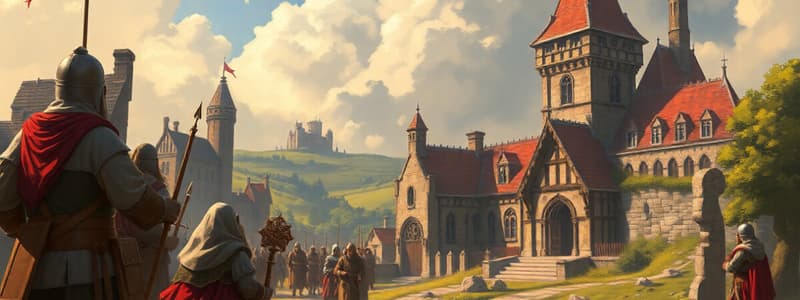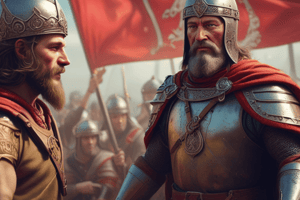Podcast
Questions and Answers
Римдіктердің Ұлыбританиядан кетуінің салдары қандай болды?
Римдіктердің Ұлыбританиядан кетуінің салдары қандай болды?
- Ұлыбритания бөлініп, бірнеше ағылшын корольдіктері пайда болды. (correct)
- Ұлыбритания Рим империясының бөлігі болып қала берді, бірақ императорлық билік әлсіреп, дәстүрлі әдет-ғұрыптар қайтадан қалпына келді.
- Ұлыбритания римдік әскерінің бақылауында қалды, бірақ олар өздерінің астанасын Римге ауыстырды.
- Ұлыбритания Греция мен Византия сияқты шығыс елдерінің билігіне өтті.
Нормандардың 1066 жылғы басып кіруі Англия қоғамына қандай әсер етті?
Нормандардың 1066 жылғы басып кіруі Англия қоғамына қандай әсер етті?
- Нормандардың басып кіруі Англияның басқару жүйесін, тілін және мәдениетін өзгерте отырып, қоғамды қайта құрды. (correct)
- Нормандардың басып кіруі Англия қоғамына ешқандай айтарлықтай әсер етпеді, өйткені англ-саксондықтар оларды жеңіп, оларды елден қуып шығарды.
- Нормандардың басып кіруі Англия қоғамына ешқандай әсер етпеді, өйткені ол тек әскери жеңіліс болды.
- Нормандардың басып кіруі Англия қоғамына ешқандай әсер етпеді, өйткені ол тек әскери жеңіліс болды.
Ағылшын Реформациясы қандай нәтижеге әкелді?
Ағылшын Реформациясы қандай нәтижеге әкелді?
- Рим-католик шіркеуінің билігін нығайтады.
- Ағылшын корольдерінің діни билігін әлсіретеді.
- Ағылшын шіркеуінің құрылуы. (correct)
- Континентальды Еуропамен дәстүрлі діни байланыстарды нығайтады.
Ағылшын Азаматтық соғысының себептері қандай болды?
Ағылшын Азаматтық соғысының себептері қандай болды?
Қандай ақылды кісілер 1707 жылы Ұлыбританияны құрды?
Қандай ақылды кісілер 1707 жылы Ұлыбританияны құрды?
Flashcards
Рим басқаруы
Рим басқаруы
43 ж. Рим Британияға басып кіріп, жоқшылықпен күресуге көмектесті.
Норман завоевания
Норман завоевания
1066 ж. Нормандиядан келген Уильям Британияны басып алды, жүйені өзгертті.
Феодализм
Феодализм
Қоғамдық жүйе, лорлар мен вассалдар арасындағы қатынастарды ұйымдастырады.
Магна Карта
Магна Карта
Signup and view all the flashcards
Глория революциясы
Глория революциясы
Signup and view all the flashcards
Study Notes
Early England
- The British Isles were inhabited by various groups, including Celts, before Roman conquest.
- The Romans invaded Britain in 43 AD, establishing settlements and infrastructure.
- Roman rule lasted for centuries, leaving behind significant archaeological evidence and lasting cultural impact.
- The Roman withdrawal in the 5th century led to a period of instability and migration.
- Anglo-Saxon kingdoms emerged, gradually unifying parts of the region.
- Key figures and developments include the Angles, Saxons, and Jutes, contributing to the formation of English culture and language.
- The arrival of Christian missionaries played a crucial role in the spread of Christianity.
- The period saw the development of early political structures and legal systems.
Medieval England
- The Norman Conquest in 1066 fundamentally reshaped English society.
- William the Conqueror's victory established Norman rule and brought significant changes to governance, language, and culture.
- Feudalism became the dominant social system, structuring relationships between lords and vassals.
- The High Middle Ages witnessed the growth of towns and trade, along with increasing royal power.
- Important events include the Magna Carta, which limited the power of the monarchy and asserted rights for nobles.
- The Hundred Years' War between England and France had a profound impact on both nations.
- The Black Death significantly reduced the population and contributed to social and economic upheaval.
- Medieval England saw the flowering of Gothic architecture and the development of a growing sense of English national identity.
Early Modern England
- The Tudor dynasty ushered in a period of significant changes.
- Key figures include Henry VIII, who led religious reformation, and Elizabeth I, whose reign fostered national prosperity and exploration.
- The Reformation led to the establishment of the Church of England, breaking away from the Roman Catholic Church.
- The English Renaissance saw a flourishing of arts and culture and significant advancements in science and exploration.
- The 17th century saw political turmoil, including the English Civil War, which led to the execution of Charles I and the establishment of the Commonwealth.
- The Glorious Revolution of 1688 marked a shift towards constitutional monarchy.
- The Act of Union in 1707 created a unified Great Britain.
Modern England
- The 18th and 19th centuries saw the rise of the Industrial Revolution.
- Industrialization transformed English society, creating new industries, cities, and social classes.
- This period saw significant social reforms, addressing issues like poverty, child labor, and working conditions.
- Britain played a major role in global affairs, expanding its empire and establishing itself as a leading world power.
- The two World Wars had a devastating impact on Britain, changing its social and economic landscape.
- The post-war era brought decolonization and significant social and economic changes.
- The latter half of the 20th century and beyond saw Britain adapting to a changing global landscape and engaging in contemporary political and social movements.
- Brexit and debates over national identity are defining elements of recent British history.
Studying That Suits You
Use AI to generate personalized quizzes and flashcards to suit your learning preferences.




